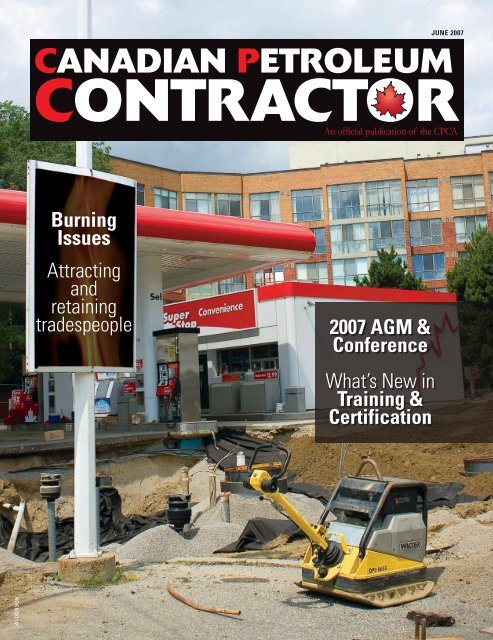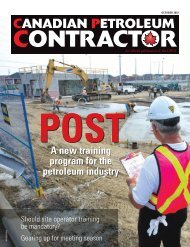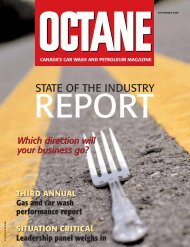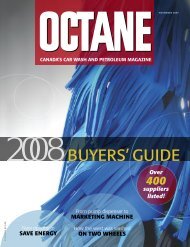CANADIAN PETROLEUM - Ugly Mugs Writing & Editing
CANADIAN PETROLEUM - Ugly Mugs Writing & Editing
CANADIAN PETROLEUM - Ugly Mugs Writing & Editing
Create successful ePaper yourself
Turn your PDF publications into a flip-book with our unique Google optimized e-Paper software.
JUNE 2007<strong>CANADIAN</strong> <strong>PETROLEUM</strong>CONTRACTORAn official publication of the CPCABurningIssuesAttractingandretainingtradespeople2007 AGM &ConferenceWhat’s New inTraining &Certification41009509
inthis<strong>CANADIAN</strong> <strong>PETROLEUM</strong>CONTRACTORAn official publication of the CPCAissue4 President’s Messageby Gord Thompson5 Regional NewsChallenge Exams in AlbertaThe Future Between SRPCS and SERM inSaskatchewanNew Safety Program in ManitobaNew Ethanol Legislation in OntarioStruggling with Trade Recognition in Quebec8 The CPCA 2007 AGM & ConferenceTraining, Workshops, Meetings, and theConvenience U CARWACS Show12 Training & CertificationWorking towards National recognition14 Burning IssuesCompetitive Wages Key to Attracting andRetaining Tradespeople12advertisersCanada Brokerlink Ltd. 11Canadian Petroleum Contractors Association 3Cormode & Dickson Construction Ltd. 6Containment Solutions, Inc. 5Polane Inc. 13National Energy Equipment Inc. 2Northern Steel Industries Ltd. 16Westeel Limited 15ZCL Composites Inc. 9Advertising Sales and Editorial Offices: Fulcrum Publications Inc.508 Lawrence Avenue West, Suite 201, Toronto, Ontario M6A 1A1Telephone: 416.504.0504 Toll-free: 1.866.688.0504 Fax: 416.256.3002Email: info@fulcrum.ca Website: www.fulcrum.caJUNE 2007 • <strong>CANADIAN</strong> <strong>PETROLEUM</strong> CONTRACTOR • 3
president’smessageRegulation and designconsistencyThis is our first issue with our new publisher, FulcrumPublications Inc.We are excited about the new directionand possibilities that this new relationship brings.The Canadian Petroleum Contractors Association magazine is thevoice of petroleum contractors and petroleum mechanics in Canada. It’syour opportunity to put issues, concerns, gripes, and yes, even goodnews and praise before your fellow contractors, mechanics, clients, regulatorsand engineers across the country. Don’t miss the opportunity towrite or email your letters or articles to the CPCA or to Fulcrum Publicationsdirectly.The CPCA will work hard toget everyone on the samepage with regard to consistencyin regulation and design.I intend to continue to flog my two pet peeves; parochialism amongthe regulators and petroleum system design by engineers who have noclue with regard to petroleum systems design let alone the regulationsinvolved.This might be somewhat quixotic but I live with the perpetualhope that one day clients will rebel when they realize the excess coststhey are bearing because of these two issues alone.The CPCA will workhard to get everyone on the same page with regard to consistency inregulation and design.Petroleum contractors must give equal priority to safety, quality, environmentalprotection, productivity, morale, and yes, profitability. I expectthat we will see articles on all of these subjects in future issues.Gord ThompsonBOARD OF DIRECTORSCPCA Member AssociationsAlberta Petroleum Storage Systems Contractors AssociationAssociation des Entrepreneurs Petroliers Du Quebec Inc.Manitoba Petroleum System Installers AssociationOntario Petroleum Contractors AssociationSaskatchewan Retail Petroleum Construction AssociationALBERTADave JonassonCentcom ConstructionTel: 403.252.5571 X.22 dave.jonasson@centcom.ab.caGerrit DehaanPetrocom Construction Ltd.Tel: 780.481.5181 gerritd@petrocomconstruction.comMANITOBAChad KenwoodCentury Petroleum ConstructionTel: 204.694.2230 centpet@mts.netKen MelnykCon.Pro IndustriesTel: 204.233.3717 ken_melnyk@mts.netONTARIOGord ThompsonComco Petroleum Management Inc.Tel: 705.728.0905 gthompson@comcopetro.comTerry AblettWagg’s Petroleum Equipment Ltd.Tel: 705.472.2500 tablet@waggspetroleum.on.caQUEBECJacques PoulinAssociation des Entrepreneurs Petroliers Du Quebec Inc.Tel: 418.872.6627 aepq03@videotron.caDenis GouletLes Equipments petroliers de Montreal Inc.Tel: 450.661.0570 mensa@videotron.caSASKATCHEWANDarcy CampbellPetrocare Construction1202 Ave. X South, Saskatoon, SK S7M 3H9306-931-2344 petrocare@sasktel.netRandy IversonNorthern Petroleum Service Ltd.Tel: 306.445.8227 northpet@sasktel.netCPCA OFFICEMichelle Rae, AdministratorMailing Address: Box 415, Markham, ON L3P 3J8Tel: 705.735.9437 Fax: 705.735.9418e.mail: info@cpcaonline.com Web: www.cpcaonline.comOFFICERS 2006Gord Thompson, President; Ken Melnyk,Vice President;Jacques Poulin, Secretary; Randy Iverson,Treasurer.4 • <strong>CANADIAN</strong> <strong>PETROLEUM</strong> CONTRACTOR • JUNE 2007
egional newsChallenge Examsin AlbertaBy Gerrit Dehaan, APSSCAIn January 2007, we held our first round ofchallenge exams based on the new CanadianPetroleum Contractors Association (CPCA)format in Calgary and Edmonton.The examswere organized by the Petroleum Tank ManagementAssociation of Alberta (PTMAA) andthe Alberta Petroleum Storage Systems ContractorsAssociation (APSSCA).The new designations of PM1 (Service andMaintenance), PM2 (Underground Installations),and PM3 (Above Ground Installations)were tested on consecutive days.The same dayreviews were completed by Jean-Marc Leblondand administered by Michelle Rae both ofwhom are from the Ontario Petroleum ContractorsAssociation (OPCA).We would like tothank them for traveling across the country toensure our people meet the new standards.Overall we had 53 individuals write thePM1 exam with a 96.2 per cent pass rate,54individuals wrote the PM2 exam with a 100per cent pass rate, and 56 individuals wrotethe PM3 exam with a 96.4 per cent passrate.We would like to thank all of the individualswho took the time out of their busyschedules to become certified PetroleumMechanics under the new CPCA banner.The Future BetweenSRPCA and SERM inSaskatchewanBy Rick Duval, SRPCAThe year started off with a bang when wehosted the Canadian Petroleum Contractorsshow in February. The event was wellattended with just under 100 people attendingthe two day event and we had representationfrom all of the CPCA member provinces.At the banquet, Gordon Thompson, presidentof the CPCA, and Rick Duval, treasurerof the CPCA, humbly received awards fortheir dedicated service to the association.In June,a SRPCA subcommittee met withSaskatchewan Environment and ResourceManagement (SERM) to address some issuesbetween the contractors and SERM and toproduce a plan that would provide the contractorswith specific direction for futureinteraction between the two organizations.This meeting resulted in SERM acceptingthe Apprenticeship and Trade status of thePetroleum Installer Technician-Journeymaneffective January 1, 2008.The meeting also identified that contractorsassociated with SRPCA cannot completeclosure reports under the Risk BasedCorrective Action Summary. The contractorsare allowed to remove the tanks butunless they hire a consultant it was felt thatthey did not have the expertise to write theclosure report. This meeting also addressedthe ULC 971-1 pipe. SERM gave permissionto use the old pipe through the 2006 constructionseason but effective January 1,2007, pipe must comply with ULC 971-1will be required on all installations. CPCJUNE 2007 • <strong>CANADIAN</strong> <strong>PETROLEUM</strong> CONTRACTOR • 5
egional newsNew Safety Programin ManitobaBy Ken Melynk, MPSIASafety has always been a paramount concernin the petroleum industry. If you look at anygas bar site that was built from the 1980sonward, big signs, lots of signs, and brightlycolored warnings are now common place.But workers still get hurt!Why do these accidents still happen in anindustry that has prided itself on being aleader in safety? Enforcement! The numbersof incidents and accidents has dropped substantiallysince the 1980s but this has beenaccomplished not by government legislationor industry regulations but by industry’sdetermination to see zero incidents and accidentson their sites.Industry now raises an eyebrow over theamount of incidents and accidents,the severity,and the number of lost days by contractorsworking on their sites. Industry is themotivating factor in the reduction of incidentsand accidents by enforcing their contractorsto work safely.But why are our workers’ families notmotivating their loved ones to be safe both atwork and at home? Education! Many people’shomes and yards are the perfect place foraccidents just waiting to happen.We need tobe able to recognize hazards not just at workbut at home too. Regular, daily activities athome might seem insignificant by comparisonto welding near aviation fuel but you canstill sustain very serious injuries from doingthe things you love to do even in your home.Industry has been very successful in introducingsafe work practices. It has also beensuccessful in tracking, monitoring, and providingcomments on accidents.Industry nowtakes steps to eliminate contractors from biddingon their projects if the contractor has apoor safety record. But even though industryis strongly committed to safety, and the numberof incidents and accidents have droppedsignificantly over the past few decades, incidentsand accidents still occur.To further reduce the number of incidentsand accidents both on the job and at home,the Construction Safety Association of Manitobaimplemented the Certificate of RecognitionProgram (COR).This safety program hasreciprocity between other provinces and isnow a prerequisite for some clients such asThe Province of Manitoba,The City of Winnipeg,andThe University of Manitoba.6 • <strong>CANADIAN</strong> <strong>PETROLEUM</strong> CONTRACTOR • JUNE 2007Industry has also made another monumentalstep forward with regard to safetywith the recent roll out of the Petroleum OrientationSafety Training (POST) program.Contractors are now expected to have completedthe POST program if they want towork on such sites as Imperial Oil, PetroCanada, Shell Canada, and Sunoco.The ManitobaPetroleum Systems InstallersAssociationis trying to get Manitoba Conservation toadopt POST as a condition of their provincialpermit.This will ensure that safety is a mandatorypart of all installations.New EthanolLegislation in OntarioBy Ken Jamieson, OPCAEffective January 2007, the Ontario Ministryof Environment mandates the annual averagesales of gasoline in Ontario must contain aminimum of 5 per cent ethanol.The OPCA met with members from theCanadian Vehicle Manufacturer Association,Canadian Petroleum Products Institute,CanadianIndependent Petroleum Marketers Association,and the Association of InternationalAutomobile Manufacturers of Canada on severaloccasions to present the industry’s safetyand environmental concerns to the MOEabout the rapid roll out of this legislation.Butdespite our best efforts in this compressedtime frame of less than a year, none of theassociations can guarantee that a gas stationwill receive ethanol blended product withoutbeing properly prepared for it.The OPCA agreed with the MOE that wewould do our best to communicate to ourmembers and customers the requirementsfor preparing themselves before they accepta delivery of an ethanol blended product.Weagreed that we will install the appropriateCPPI coloured labels for an ethanol producton the fill pipes when,as a minimum,the correctfilters are installed on thepumps/dispensers as this is the last safeguardto prevent a customer from getting “bad”product.This label will then identify to thefuel delivery personnel that the site has beenprepared for ethanol blended product.By installing these CPPI labels on the fills,all we are saying is that at the time of theinstallation of the label, the site has at leastbeen made aware of the concerns withaccepting ethanol blended product, and as aminimum, the correct filters have beeninstalled on the dispensers.We suggest thatyou also provide your customers with a letterstating exactly that.Checklist for Fuel Dispensing FacilitiesSwitching to Ethanol-blended Gasoline:Ontario Ministry of Environment –http://www.ene.gov.on.ca/envision/ethanol/ethanolchecklist.htmEthanol – InformingYour Customers:Template available at www.opcaonline.orgSteps to Prepare a Sitefor Ethanol Product:• Share the “Checklist for Fuel DispensingFacilities Switching to Ethanol-blendedGasoline” with your customer and decidewhat they would like you to do.• If they have pre-1978 fibreglass tanksthey will have to be replaced.• As an absolute minimum 10 micronalcohol monitoring filters should beinstalled on all pumps and dispensers justprior to receiving the product.• Install new tags on the fill pipes matchingthe CPPI colour for ethanol blended gasoline.• Make sure the site has ethanolcompatible paste for dipping the tanks.• Remove all water from the bottom of thetanks and recommend cleaning the tanksto remove as much sediment, rust, andscale as possible.• Give the sites a letter that follows thetemplate available at www.opcaonline.org.• Monitor the site tanks and inventory veryclosely for a while after receiving the product.• Don’t mix non-ethanol product withethanol product.CPC
egional newsStruggling with TradeRecognition in QuebecBy Jacques Poulin, AEPQIn Quebec, the installation of a toilet bowl isconsidered more risky than the installationof a petroleum tank. If we consider Quebecregulations,there is a higher risk of installinga toilet in an apartment building thaninstalling a 50,000 litre petroleum tank on abusy street in any major city.To install a toiletin an apartment building,a licensed plumberis required but anyone can install a petroleumtank.The Quebec Petroleum ContractorAssociationwas founded in 1972 and since thattime, we have tried to get our trade recognizedby promoting the association andpetroleum contractors to the following governmentagencies,without any success.• Ministry of Labour• Ministry of Natural Resources• Ministry of Environment• Ministry of Education• Ministry of EmploymentFinally, in 2006, the petroleum sector wasidentified as a high risk activity by the QuebecBuilding Board.The role of this organizationis to ensure the safety of the public andthe quality of work.The QBB is only involvedwith the qualifications of contractors by issuingoperating licence 4515 but they are notinvolved in employee qualification.The CPCA training and certification programhas been submitted to various governmentagencies.These agencies’ reaction tothe program has been positive. However,they say they must own the program inorder to accept it.Within the Petroleum Labour-ManagementCommittee, we have a surplus thatwould be sufficient to pay for the translationof all CPCA training material intoFrench, and at the same time proceedwith the CPCA certification of all ouremployees.The Ministry of Labour has forbidden usfrom using our surplus when other labourorganizations can use their surplus.It seems to us that, in Quebec, it is notpossible to accept what is well done andworks in other provinces and that it is possibleto stop any constructive initiativesoriginating in the private sector. CPCLutte pourla reconnaissanceprofessionnelleau Québecpar Jacques Poulin, AEPQAu Québec, l’installation d’une toilette estconsidérée plus à risque que l’installationd’un réservoir pétrolier. Si l’on se fie à laréglementation existante, il est plus risquéd’installer une toilette dans un immeublerésidentiel qu’un réservoir pétrolier de 50000 litres sur une rue achalandée den’importe quelle ville. En effet, pour installerune toilette dans un immeuble résidentiel, ilfaut détenir une licence de plombier alorsque n’importe qui peut faire l’installationd’un réservoir pétrolier.L’Association des entrepreneurs pétroliersa été fondée en 1972. Depuis ce temps, nousavons tenté de faire reconnaître notre métieren faisant des représentations pour promouvoirl’association et les entrepreneurspétroliers auprès des ministères suivant, toujourssans résultat.• ministère du Travail• ministère des Ressources naturelles• ministère de l’Environnement• ministère de l’Éducation• Emploi-QuébecLe domaine pétrolier a été finalementreconnu par la Régie du Bâtiment commeétant un secteur à risque élevé en 2006.Cependant, la Régie du Bâtiment, dont lerôle est d’assurer la protection du public etla qualité des travaux, s’occupe strictementde la qualification des entrepreneurs enleur émettant une licence qui porte lenuméro 4515 et n’a rien à voir avec la qualificationde la main-d’?uvre.Le programme de formation et de certificationdu C.P.C.A. a été présenté à diversorganismes gouvernementaux. Leur réceptiona été positive, mais ils disent devoirposséder la propriété intellectuelle d’unprogramme pour pouvoir l’accepter.Au Comité pétrolier de consultationpatronale-syndicale, nous avons un surplusaccumulé qui serait suffisant pour nouspermettre de traduire en français tous lesmanuels de formation de la C.P.C.A. etd’obtenir pour tous nos employés la certificationC.P.C.A.Le ministère du Travail nous interditd’employer nos surplus à ces fins alorsque d’autres organisations de travail peuventle faire.Il nous semble qu’au Québec,on ne puisseadmettre comme valable ce qui se fait de bondans d’autres provinces et que nous possédonscette capacité d’arrêter les initiativesconstructives venant du secteur privé.JUNE 2007 • <strong>CANADIAN</strong> <strong>PETROLEUM</strong> CONTRACTOR • 7
The CPCA2007 AGMand ConferenceTraining, workshops, meetings, and the Convenience U CARWACS Showby Michelle Rae, CPCA/OPCA AdministratorThe Canadian Petroleum Contractors Association’sAnnual General Meeting washosted by the Ontario Petroleum ContractorsAssociation during their Annual Conferencein conjunction with the 2007Convenience U CARWACS Show betweenMarch 6 and 8, 2007 at the Toronto CongressCentre.On behalf of the Board of Directors, I would like to thank all ofthe members who attended and to those who traveledfrom across Canada to Toronto.The OPCAwelcomed members from their fellow associations;the Alberta Petroleum Storage SystemContractors Association, the Saskatchewan RetailPetroleum Construction Association, the ManitobaPetroleum System Installers Association, and the Associationdes Entrepreneurs Petroliers du Quebec. Itwas a jam-packed few days with the manufacturertraining, code workshops, meetings, Petroleum OrientedSafety Training, and the Convenience UCARWACS Show!The petroleum equipment manufacturer certificationtraining was held on March 6th. I would like to thank JimRodd (Red Leonard) for the APT and FE Petro Training, BobLeonard (Pipe Specialties) for the Ameron training, Dave Camp-PHOTOS BY JASON F SCHNEIDER8 • <strong>CANADIAN</strong> <strong>PETROLEUM</strong> CONTRACTOR • JUNE 2007
The OPCA hosted the launch of the Petroleum Oriented SafetyTraining (POST) program. The program was well received withalmost two hundred and fifty people in attendance.bell (LTS-Noremco) for the UPP-Petrotechnik training, and RichardMartineau (OPW Canada) for the OPWFCS training.Dave Kerr of TS Technical Training hosted a workshop for thenew Ontario Installation Code for Oil-Burning Equipment (B139-ON-06).Thank you to Dave for running this very informative workshop.The OPCA also held a workshop to review the anticipatedchanges to the Ontario Liquid Fuels Handling Code.A summary ofthe workshop highlighting the changes is available on the OPCAwebsite at www.opcaonline.org. One of the most significantchanges The Technical Standards & Safety Authority, Ontario’s governingauthority for fuels, has added is a Leak Detection Sectionincluding a requirement to install electronic line leak detection tosingle wall piping and a schedule outlining the deadlines based onthe age of the piping.The OPCA Annual General Meeting was held on the morningof March 8th. OPCA president Ken Jamieson provided a summaryof the activities of the association’s Board of Directors and staff.OPCA is represented on TSSA’s Petroleum Advisory Council providingindustry feedback and recommendations on regulatoryissues, their Risk Reduction Group which meet as required toestablish the necessary safety bulletins as issues arise, and theirTraining and Certification Advisory Board which establishes standardsand minimum requirements for industry training and certificationfor the liquid fuels industry. The TCAB recentlycompleted updates and revisions to the policies and proceduresfor Petroleum Mechanic and Site Operator certification. Part ofthe revisions include the defining all of the petroleum mechaniclicense categories and their training curriculum in a more clearand concise manner.Ken also reported that the ethanol issue is still in the forefrontwith the Ontario Ministry of Environment not giving service stations,refineries, or distribution terminals enough time to prepareand the issues that the rapid implementation could potentially haveon vehicles.JUNE 2007 • <strong>CANADIAN</strong> <strong>PETROLEUM</strong> CONTRACTOR • 9
Our goal for the upcoming year is to continue to promote theindustry, its associations (CPCA and its member associations) andits members though various outlets including this magazine.The OPCA welcomed John Marshall,TSSA’s newly appointedDirector of Fuels Safety to their AGM.Also in attendance from TSSAwere several inspectors from their Fuel Safety branch includingTeam Leader Kendall Miles. John and Kendall both addressed themembership touching on the positive relationship between theOPCA and TSSA.CPCA representatives provided a report on their respectiveprovinces. Gerrit Dehaan of APSSCA reported the large number ofindividuals who are now CPCA certified.The CPCA AGM followed the OPCA AGM and was attendedby APSSCA representatives Gerrit Dehaan and Dave Jonasson,SRPCA representatives Rick Duval and Randy Iverson, MPSIArepresentatives Ken Melnyk and Chad Kenwood, OPCA representativesGord Thompson and Terry Ablett, and AEPQ representativeJacques Poulin. CPCA president Gord Thompson notedwhile the CPCA Petroleum Mechanic Certification program hasbeen well received and adopted by Alberta, Saskatchewan andManitoba, the association must continue to lobby the programto be adopted in Ontario and Quebec which may haveaccepted the idea of a national standard but no official agreementshave been reached. The CPCA currently has over twohundred certified petroleum mechanics across Alberta,Saskatchewan, and Manitoba.OPCA Recommended PracticesThe OPCA released their first edition of Recommended Practicesfor above-ground and underground storage tank installation andremoval, piping and fittings, and leak prevention.This booklet wasdesigned as a quick reference guide for petroleum contractors as isavailable through the OPCA at 1-866-360-OPCA orwww.opcaonline.org.The cost is $45.00 for members and $75.00for non-members. Members received one free copy per company.10 • <strong>CANADIAN</strong> <strong>PETROLEUM</strong> CONTRACTOR • JUNE 2007
Petroleum Oriented Safety TrainingThe OPCA hosted the launch of the Petroleum Oriented SafetyTraining (POST) program.The program was well received withalmost two hundred and fifty people in attendance.The POST program outlines the responsibilities of the owners,supervisors and workers on a petroleum site showing the requiredsafety documentation used on petroleum sites to ensure the safetyof all workers.At the presentation, OPCA president Ken Jamiesonnoted that“safety shouldn’t be confusing”and emphasized what anaccomplishment it has been to get this program in place in lessthan nine months.The POST committee included presentations from representativesfrom Imperial Oil, Petro-Canada, Shell Canada, and SuncorEnergy Products who have adopted this behavior based program asa national standard for all of their petroleum sites with the emphasisfor all workers to “Stop & Think”.The committee also includesOPCA Directors Ken Jamieson (ECS Engineering & Construction)and Lou Cerruti (Claybar Contracting) as well as OPCA staff includingJean-Marc and myself.The committee is currently working on amaintenance program for service technicians.The CPCA hosted the Western Canada launch in Calgary onApril 4th.The program is available on-line at www.posttraining.ca.The conference was not all work and business. Members were ableto take a break from the seminars and show by attending what hadto be the highlight of the three days – the dinner and performanceby comedian Big Daddy Tazz.Tazz has appeared on various TV specialsincluding the Winnipeg Comedy Festival and Just for LaughsComedy in Montreal. Following the dinner, members enjoyed thehospitality rooms hosted by LTS-Noremco, Hi-Sharp and NationalEnergy Equipment.Last but not least,we could not have had such a successful conferencewithout the generous contributions of our sponsors.They are:industry, its associations (CPCA and its member associations) andits members though various outlets including this magazine. Ourmembers have one of the highest standards of safety and trainingcompared to similar industries. Individuals must not only receivetraining and certification for any work being done on the variouspetroleum systems (there are four license categories) they mustalso receive manufacturer training on the equipment they areworking on as well as all required safety training.The result is ourmembers enjoy an excellent safety track record.The 2008 CPCA Annual General Meeting will be hosted by theAlberta Petroleum Storage System Contractors Association(APSSCA). Stay tuned to the CPCA website at www.cpcaonline.comfor upcoming details.See you in Alberta in 2008!CPC• Canada Brokerlink• Clemmer Steelcraft Technologies• Dundee Wealth Management• Dresser Wayne• Hi-Sharp• Leak Technologies Solutions Inc.• LTS-Noremco• National Energy Equipment• Pro-Line Petroleum Distribution Inc.• Southwest Energy Control Systems of Canada Ltd.• Waleco Inc.• ZCL Composites Inc.The support of these companies year after year is greatly appreciated!Our goal for the upcoming year is to continue to promote theJUNE 2007 • <strong>CANADIAN</strong> <strong>PETROLEUM</strong> CONTRACTOR • 11
Working TowardsNational Recognitionby Michelle Rae, Training Program Managertraining &certificationAlberta CertificationAs Alberta Petroleum Storage Systems ContractorsAssociation president GerritDehaan mentioned in his article, welaunched challenge exam sessions for theCPCA Petroleum Mechanic certificationprogram in January 2007 and certified overtwo hundred individuals.The participantshad prior Alberta certification in theprovince.The sessions were well receivedby all of the contractors that attended all ofwhom agreed the exams were challengingto say the least! Not only did we certifyindividuals under the PM2 (UndergroundThis [certification]is a major steptowards petroleummechanics beingrecognized on anational level.Installation) and PM3 (Aboveground Installation)license categories, a large number ofservice technicians were certified underthe PM1 (Service & Maintenance) categorywho were not previously recognized inAlberta in this specific trade. I would like tothank Gerrit Dehaan and Don Edgecombeof the Petroleum Tank Management Associationof Alberta (PTMAA) for organizing allof the training sessions that were held inCalgary, Edmonton, and Grande Prairie withmuch success. I would also like to thank allof the contractors for their hospitality andpositive reception to the program.This [certification]is a major step towards petroleummechanics being recognized on anational level.12 • <strong>CANADIAN</strong> <strong>PETROLEUM</strong> CONTRACTOR • JUNE 2007Lobbying Our Program Across CanadaThe CPCA training and certification programis recognized in Saskatchewan as acertified trade through their apprenticeshipand trades program. Effective January2008, Saskatchewan Environment will mandatethat anyone working on petroleumsystems must be CPCA certified and/orhold the Saskatchewan trade certification.For more information on the SaskatchewanApprenticeship and Trade petroleummechanic program visitwww.saskapprenticeship.ca.Certification in Manitoba has been wellunderway for over a year with many individualsreceiving CPCA certification whoare recognized by Manitoba Conservation.The CPCA appreciates the support it hasreceived from the provincial authorities inManitoba,Alberta, and Saskatchewan.I am also pleased to report we havemade significant progress in British Columbia.Work on petroleum systems currentlyfalls under various trades without specificcertification. Not only has the province ofBritish Columbia recognized the need forformal training but it has also recognizedthe need for specific designation and recognitionfor petroleum mechanics. Clyde Scollan,President of the Construction LabourRelations of British Columbia has presentedthe CPCA training and certification programto various provincial regulatory andindustry training sectors and he reportsthat the initial response is positive. TheCPCA will continue to assist in facilitatingthe program in British Columbia. I will keepyou posted on our progress!We continue to lobby the program inOntario and Quebec. In Ontario, the TechnicalStandards and Safety Authority (TSSA)has made steps to adopt the hour requirementbased on the CPCA’s certificationrequirements in their upcoming revisedpetroleum mechanic training and certificationpolicies.At this time, we do not have aneffective date as this and other policychanges requires provincial governmentregulatory approval.In Quebec, our CPCA directors representingthis province are working very hardto get proper trade designation for petroleummechanics in Quebec, obtaining governmentfunding to translate all of ourtraining and certification materials intoFrench language and overall recognition ofthe CPCA program.Petroleum Oriented Safety TrainingAs a petroleum contractor, if you do anywork for major oil companies, you alreadyknow the Petroleum Oriented SafetyTraining (POST) program has beenadopted by Imperial Oil, Petro-Canada,Shell Canada, and Suncor as a minimumrequirement for work on their sites. *Atthe time of this writing, the program wasin place for new site and/or site upgradeconstruction and a program for service iscurrently being developed.The program outlines the responsibilitiesof the owner, supervisor and workerwith specific focus on the supervisor andworker.Highlights of the program include:• How you can effectively change yourbehaviour towards safety• Proper Personal Protective Equipmentand why it’s important• How to properly complete the necessaryforms and checklists, for example, JSA,Daily Safe Work Permit, and Work atHeights Checklist.POST forms and checklists will be usedacross Canada on all major oil companies’petroleum sites.POST sessions were launched in Torontoin March 2006 in conjunction with theOPCA annual conference and in Calgary inApril. Online training is available throughthe POST website at www.posttraining.ca.The POST guide, along with the necessaryforms and checklists, can be downloadedfor free on the POST website.For information on CPCA’s national certificationfor Petroleum Mechanics visitwww.cpcaonline.org.CPC
Competitive Wages Keyto Attracting and RetainingTradespeople by Gord Thompson, PresidentburningissuesAlthough attracting and retainingtradespeople is not a challenge exclusiveto the petroleum contractingindustry, the inability of the petroleum contractingindustry to offer competitive wagesas compared to other industries is definitelyan issue. So too is a requirement for moretraining and certification.The wages that the CPCA’s membercompanies pay their tradespeople are indirect competition with what the manufacturing,construction, and oil and gas industriesare paying.The wages the petroleumcontracting companies currently offer arenot high enough to attract and retrain qualifiedtradespeople.In addition to low wages, a lack ofcomprehensive safety, technical, and14 • <strong>CANADIAN</strong> <strong>PETROLEUM</strong> CONTRACTOR • JUNE 2007management training has in the past hadsome bearing on the ability of the petroleumcontracting industry to attract andretain tradespeople. Today, projects aremore technically challenging and complexand tradespeople require moretraining and certification to work onthese projects.To help our member companies attractand retain qualified tradespeople, the CPCAhas established a national training and certificationprogram for petroleum mechanics.This program will raise the trade’simage and provide more credibility withclients.We have also adopted the OntarioPetroleum Contractor’s Association’s recommendedpractices guide. The recommendedpractices guide outlines bestpractices for Leak and Spill Prevention, Piping,Aboveground and Underground TankInstallation and Removal.New legislation in several provincesmandates certain training and certificationfor petroleum mechanics. This isgood news for petroleum mechanics as apetroleum mechanic who is trained andcertified can command a higher wagewhich in turn attracts more people to theindustry.As an industry, we must acknowledgethe issues of lagging wages and the need toincrease training and certification for petroleummechanics.With competitive wagesand the right training and certification, wecan attract new people to the industry andretain our current tradespeople. CPC
Division of VicwestOperating Limited PartnershipPROTECTING TOMORROW ... TODAY!Leading Canadian manufacturer of aboveground double and single wall ULC tanksSafe and secure underground storage of liquidsCUTAWAY VIEWPrimary TankFibre Interstitial LayerFRP Secondary Containment TankBox 1718 Tisdale, Saskatchewan, Canada S0E 1T0Tel: 306 873.4531 • Fax: 306 873.2252TOLL FREE: 1 888 674.8265nsi@northern-steel.comwww.northern-steel.comSteelTank® Institute







